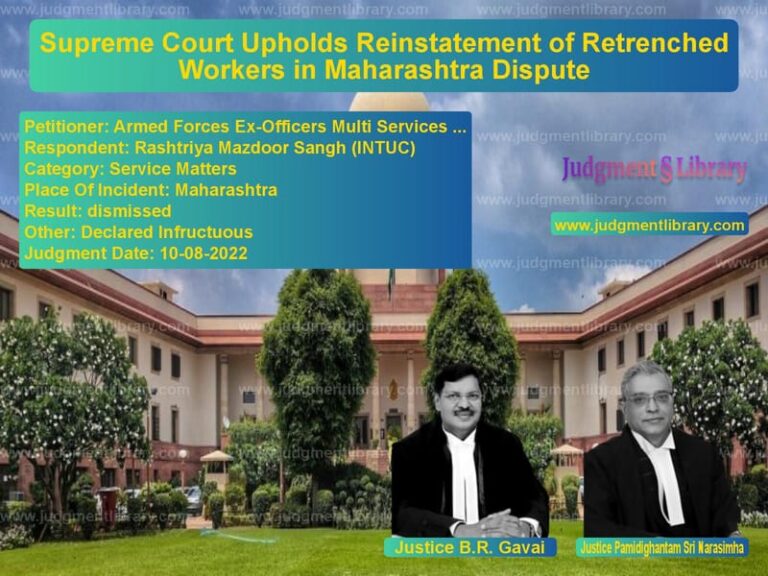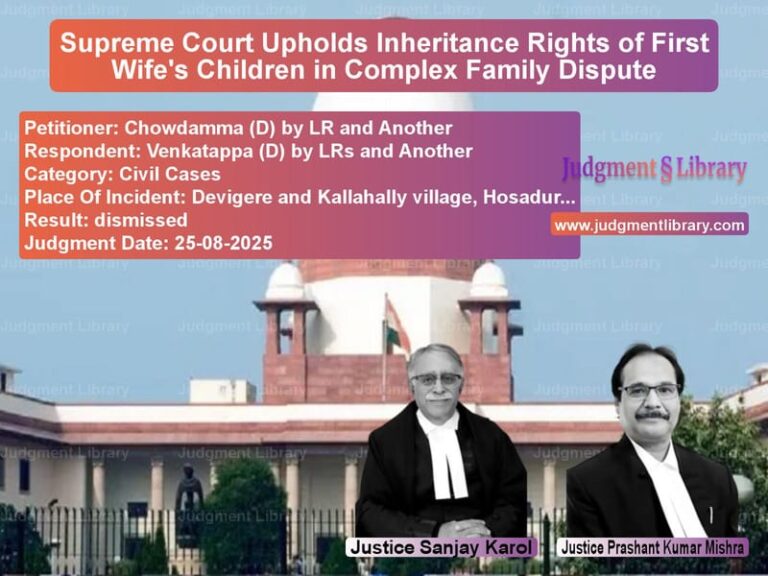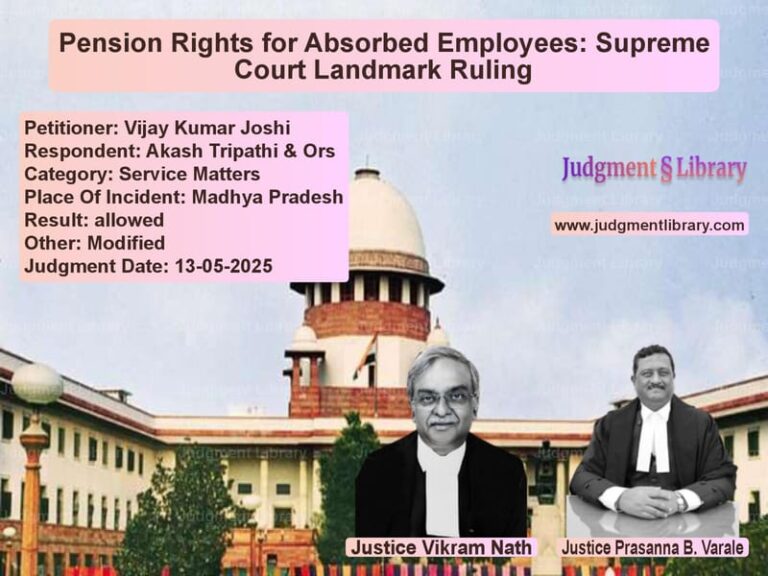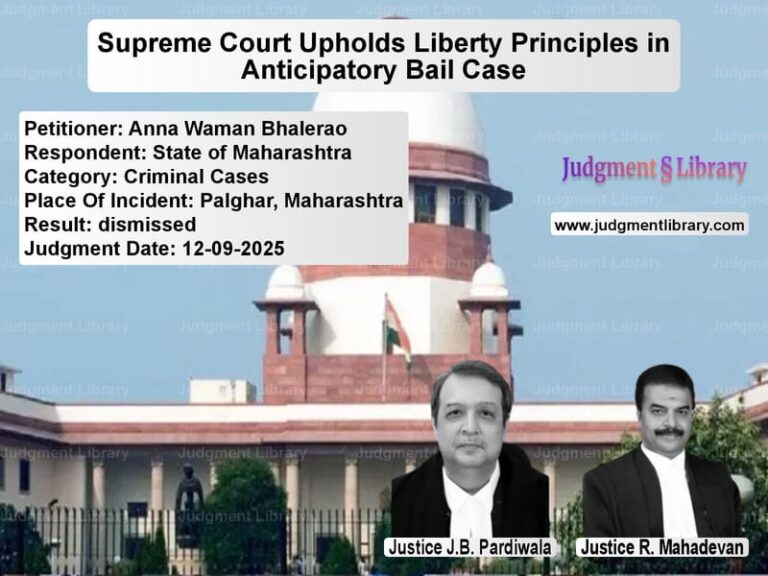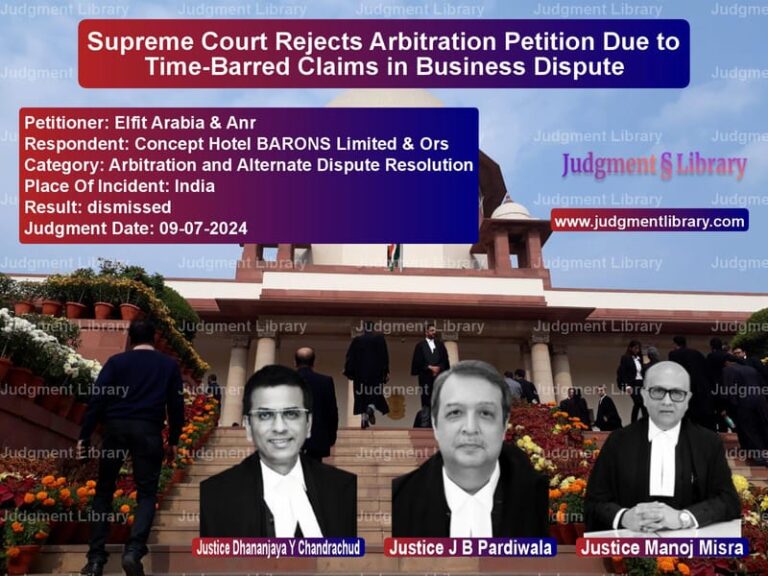Supreme Court’s Landmark Judgment on Chandigarh Land Acquisition: Legal Validity and Key Rulings
The case of Raj Kumar Gandhi vs. Chandigarh Administration & Ors. revolves around land acquisition disputes under the Land Acquisition Act, 1894. The appellants challenged the acquisition process, alleging it had lapsed due to delays and improper authorization of the award. The Supreme Court was tasked with determining the legal validity of the acquisition, particularly regarding procedural compliance and statutory timelines.
Background of the Case
The legal dispute originated from a notification issued under Section 4 of the Land Acquisition Act on January 31, 1992, for the development of a residential and commercial complex under Scheme No.3, Pocket No.8, in Chandigarh. A subsequent declaration under Section 6 was issued on January 29, 1993.
The appellants, including Raj Kumar Gandhi, Avtar Singh, and Kailash Wati, filed writ petitions before the Punjab and Haryana High Court, contending that:
- The acquisition had lapsed as the award was issued beyond the legally mandated timeframe.
- The approval for the award was given by the Advisor to the Administrator, rather than the Administrator, making it invalid.
- The authorities had misinterpreted the effect of interim stay orders from previous litigation.
The High Court dismissed their petitions, leading them to appeal before the Supreme Court.
Arguments by the Petitioners
The petitioners raised several key arguments:
- Delay in Passing the Award: They argued that the award was passed beyond the stipulated period of two years from the declaration under Section 6, which should render the acquisition void.
- Improper Authority Approval: The award was approved by an Advisor instead of the Administrator, allegedly violating statutory requirements.
- Effect of Interim Stays: The petitioners contended that previous interim stays did not apply uniformly across different pockets of Scheme No.3 and should not be used to justify delays.
- Violation of Landowners’ Rights: The petitioners asserted that undue delay caused financial loss and uncertainty for landowners.
Arguments by the Respondents
The Chandigarh Administration and the Union of India countered these claims, arguing:
- Legal Stay Periods Extended the Timeline: Due to multiple legal challenges, acquisition proceedings were halted by court orders, making it legally permissible to extend the award timeline.
- Approval by Advisor Was Lawful: As per the Chandigarh (Delegation of Powers) Act, the Advisor was authorized to approve the award, making it legally valid.
- Public Interest in Development: The land acquisition served a larger public interest, and procedural objections should not override developmental needs.
Supreme Court’s Observations
The Supreme Court, led by Justice Arun Mishra, analyzed the arguments in depth. The Court made the following key observations:
“The moment the court grants a stay, it becomes impracticable, if not impossible, to execute the scheme for the land stands notified for acquisition and everything comes to a standstill.”
It concluded that:
- Multiple interim stay orders delayed the acquisition process, and these periods must be excluded from the timeline calculation.
- Since the award was passed within the revised timeframe after excluding the stay periods, the acquisition had not lapsed.
- The Advisor had lawful authority to approve the award under the existing delegation of powers.
Legal Precedents Cited
The Supreme Court relied on several precedents to reinforce its judgment:
- Puran Chand Gupta v. Union of India (1999): Established that court-ordered stays must be considered when determining statutory timeframes for land acquisitions.
- Yusufbhai Noormohmed Nendoliya v. State of Gujarat (1991): Clarified that any delay caused by court orders must be excluded when calculating the validity period of an acquisition.
- Sangappa Gurulingappa Sajjan v. State of Karnataka (1994): Held that once an acquisition is stayed, authorities cannot proceed, and the time spent under stay should not count towards statutory deadlines.
Final Judgment
The Supreme Court dismissed the appeals and upheld the High Court’s ruling. It held that:
- The acquisition was legally valid and had not lapsed.
- The award was passed within the legally permissible period, considering the stay durations.
- The approval granted by the Advisor was legally sound under delegation provisions.
The judgment reaffirmed the principle that legal stays impact statutory timelines and upheld the legitimacy of Chandigarh’s land acquisition process.
Petitioner Name: Raj Kumar Gandhi.Respondent Name: Chandigarh Administration & Ors..Judgment By: Justice Arun Mishra, Justice Uday Umesh Lalit.Place Of Incident: Chandigarh.Judgment Date: 11-05-2018.
Don’t miss out on the full details! Download the complete judgment in PDF format below and gain valuable insights instantly!
Download Judgment: Raj Kumar Gandhi vs Chandigarh Administr Supreme Court of India Judgment Dated 11-05-2018.pdf
Direct Downlaod Judgment: Direct downlaod this Judgment
See all petitions in Property Disputes
See all petitions in Landlord-Tenant Disputes
See all petitions in Contract Disputes
See all petitions in Judgment by Arun Mishra
See all petitions in Judgment by Uday Umesh Lalit
See all petitions in dismissed
See all petitions in supreme court of India judgments May 2018
See all petitions in 2018 judgments
See all posts in Civil Cases Category
See all allowed petitions in Civil Cases Category
See all Dismissed petitions in Civil Cases Category
See all partially allowed petitions in Civil Cases Category


